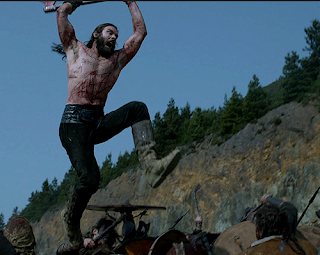History on Halloween
As
a Christian historian, one of my pet peeves is people that find a non-Christian
aspect of one of their culture’s traditions, condemn it, and those whom
continue to enjoy it. When Halloween rolls around I’m inundated by various social
media crusaders, and old people that still participate in email chain letters
about Christians worshiping Satan one night a year.
The
truth is, “Satanism” is a recent religion which developed long after
Halloween, and is more about sexual promiscuity and substance abuse, than Lucifer.
That
it is not to say that evil, or evil religious practices/worship are new, they are in fact far
older than the Christian faith itself (See the Old Testament). All
religions of note recognize the existence of good and evil, though gods are often capable of both, and have since
man’s creation.
(That flapping sound you just heard was my credibility
flying out every atheist’s, reading this article, window)
Most
ancient, we’ll say, Pagan faiths are/were polytheistic: permits worship, recognition, and supplication to many gods and goddesses. Some deities were kind, even jovial, and some were more sinister, even downright evil. (I believe this ancient, universal
struggle of man to find his god, to be strong evidence in favor of the Gospel
narrative.) The early church struggled to make its message relative to such cultures, as it spread throughout the Iron-age world. The trick in missions is, as it was then, to make the Gospel
of Christ relate to a culture without altering, or changing the message itself. It can often be challenging to walk the line
between Acts 15:10 and Revelation 22:18, and in the process things can get a little
weird...
There’s
a term you may remember from high school geography class, Cultural Diffusion. The exchange of goods, people, and ideas
inevitably leads to changes in culture. When Rome for example, conquered one barbarian
tribe and encountered another, there were more than harsh words and blows
exchanged. Culture is: religion,
tradition, customs, food, art, and etc.
All of which, were exchanged in ancient times through both war and trade.
When Constantine made Matt 28:16 government policy, he was more concerned with
unity than with policing specific observances.
Rather
than completely eradicate the competing religions and traditions, The Church simply
“Christianized” them. For example:
Valkyries became angels, and shrines to Freyja, became shrines to Mary, Mother
of God. Holidays were Christianized as
well, festivals meant to garner favor from the gods on winter solstice
became, Christmas. (The whole tree thing was a remnant of a pagan Nordic/German
tradition and didn't catch on in the states or the UK, until after WWI) Many cultures venerated the
dead/made sacrifices to the deities of the underworld. The Church’s
solution was simple, yet brilliant! They called on Christians to celebrate the Saints that had passed on. All Hallow’s Even, (or eve) was followed by All
Saints Day.
The American version of All Hallows Even/eve (Halloween) came from Ireland. The Irish didn’t have much of a “Ghost”
tradition until the Vikings/Normans showed up but they believe in fairies, or the sídhe (“Shee”) as
they call them. Their priests or Druids, (we call witches) like most
shamanistic faiths, worshiped nature. They
also believed in the existence of another world, where mystical beings, shape-shifters
and such existed, and occasionally crossed over. The Irish Halloween, is the
Christianized version of the celebration of the festival of Samhain, not the Samhain that witches and weirdos celebrated as below:
(If your Halloween looks like this, you're a witch/weirdo)
When
the Potato famine and the ever antagonistic English displaced millions of Irish
in the 1800’s, many sought refuge in the U.S.
It wasn’t long before everyone in the states started playing dress up,
telling spooky stories, and eating sweets on the evening before a religious
holiday they never heard of. So if you
aren’t worshiping Satan, dancing naked around a bonfire, or sacrificing animals
on Halloween then you aren’t following an evil tradition, just a mix of several
silly traditions that have been Christianized, diffused, corrupted, and passed down through
our nations fascinating and diverse history.
So grab your Shrek or Gingerbread man mask, and have a good time with
your kids!
Conclusion:
To me Halloween is hardly a holiday, it's like Presidents' Day... Whenever that is.... I don't celebrate/participate in it, but I don't care if anyone else does either. A wise man once told me: "when in doubt, glorify God." If what you're doing, doesn't serve our calling, it's not required and if it causes sin to occur, stop it. I don't believe dressing up causes sin, but if you feel convicted, don't do it. BUT remember that if we judge our piety by the standards of
those silly emails floating about, we may as well stop going to church on Sunday, throw out our calendars, Christmas presents, and Easter baskets...
Oh wait… You didn’t know we celebrate Christ’s resurrection on a pagan
deity’s day?
Believe it or not, we use a pagan calendar that was later made MORE pagan by a monk, that in another time would’ve been burned as a witch. Aaaand it was all approved by the Pope! There are non-Christian aspects to much of our culture but that doesn't make us bad Christians, it makes us human. So my brothers and sisters, let’s focus on God and not fight over man made traditions.
Believe it or not, we use a pagan calendar that was later made MORE pagan by a monk, that in another time would’ve been burned as a witch. Aaaand it was all approved by the Pope! There are non-Christian aspects to much of our culture but that doesn't make us bad Christians, it makes us human. So my brothers and sisters, let’s focus on God and not fight over man made traditions.
I’ve included the breakdown of the calendar
below:




















